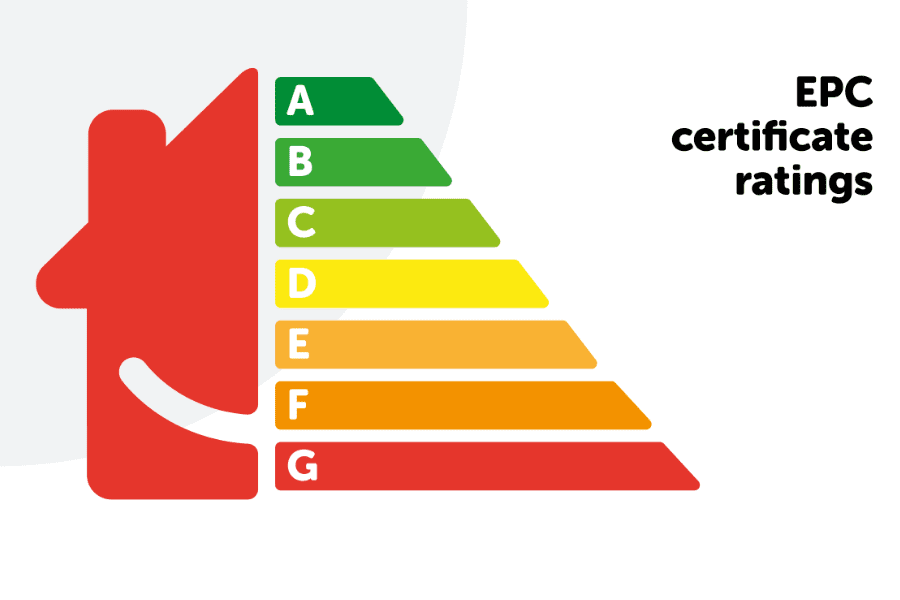Energy saving advice
What is an EPC Certificate? And How To Get One
30 May 2023 • 4 minutes

Energy saving advice
30 May 2023 • 4 minutes

With the rising cost of energy prices, we’re all looking for ways to be more energy efficient – the most effective way to understand how much energy you use at home is with an up-to-date Energy Performance Certificate (EPC).
The chances are, if you’ve bought, sold or rented property before you’ll probably have seen an EPC certificate and maybe not know what it is. They’re much like that rainbow sticker that you find on home appliances, but for your whole property.
In this guide we’ll give you everything you need to know. From what an EPC is – to how you can get your hands on one.
Let’s start with the basics. An EPC certificate is a survey that shows how energy efficient your property is. It will include an estimate of energy costs, as well as an energy performance summary for your home.
Your document will include recommendations to make your home more energy efficient, as well as estimated costs to make the changes and the potential savings you could make.
Your EPC certificate is a legal requirement if you’re selling or renting your property. As soon as your property is up for sale or rent, your EPC needs to be available to make it easier for potential buyers to compare the energy efficiency of different properties.
Because your EPC certificate highlights areas where you can improve your energy efficiency, you can also get an EPC without wanting to sell or rent your property. This can be useful if you’re looking to improve your current home.
If you decide to get a new EPC certificate for your property, you should keep in mind that figures for energy use and potential savings are not tailored to you or your family, but are based on a typical number of people who live in that property.
If you’re looking to find your current EPC rating, the government has an EPC register which allows you to search for homes, business properties and public buildings throughout England, Wales and Northern Ireland.
There’s a different service that deals with certificates for properties in Scotland.
Your EPC certificate will last 10 years, so if you find your EPC is out of date then you should look to get a new one.
To get an approved EPC certificate, you must get a Domestic Energy Assessor to produce your EPC. You can find an approved Domestic Energy Assessor, here.
However, if you are selling or letting your property then it would usually be the job of your Estate Agent to organise this for you, although this can be more expensive than doing it yourself.
Once you’ve received your EPC rating, you’ll be given recommendations on how to improve the less efficient areas of your home. It’s often pretty straight-forward stuff, such as switching to energy saving light bulbs.
However, some can be a bit more complex and costly, such as getting a more efficient boiler or adding more insulation to your home. If you’re looking into insulation, our guide into insulating your house will come in handy.
You can also make some small changes that can help save you energy and money on your bills. Our guide to energy saving tips at home is packed with hints and tips to help you get started.
You may also be interested to know how much energy your appliances are using, or more importantly, which ones use the most – you can find out more in this helpful guide.
EPCs are valid for 10 years, so it may be that your property already has a valid certificate. You can use the EPC register to look up and check.
With some providers you can pay up to £120 for an EPC certificate, but this can depend on the size of your home. Although you should be able to find it much cheaper, so it’s worth shopping around.
While all homes need an EPC before they can be sold or let, there’s no difference between what providers offer. It’s usually worth going directly to a domestic energy assessor rather than paying your estate agent.
When you have an EPC survey, your property is ranked on a scale of A to G – so you won’t get a pass or fail.
However, since April 2020 it’s been a legal requirement that your EPC should have a minimum rating of E, if you’re renting out your property throughout the UK, including Scotland.
Our help & advice articles cover Plumbing, Home heating, Electrical, Energy-saving and Home maintenance.